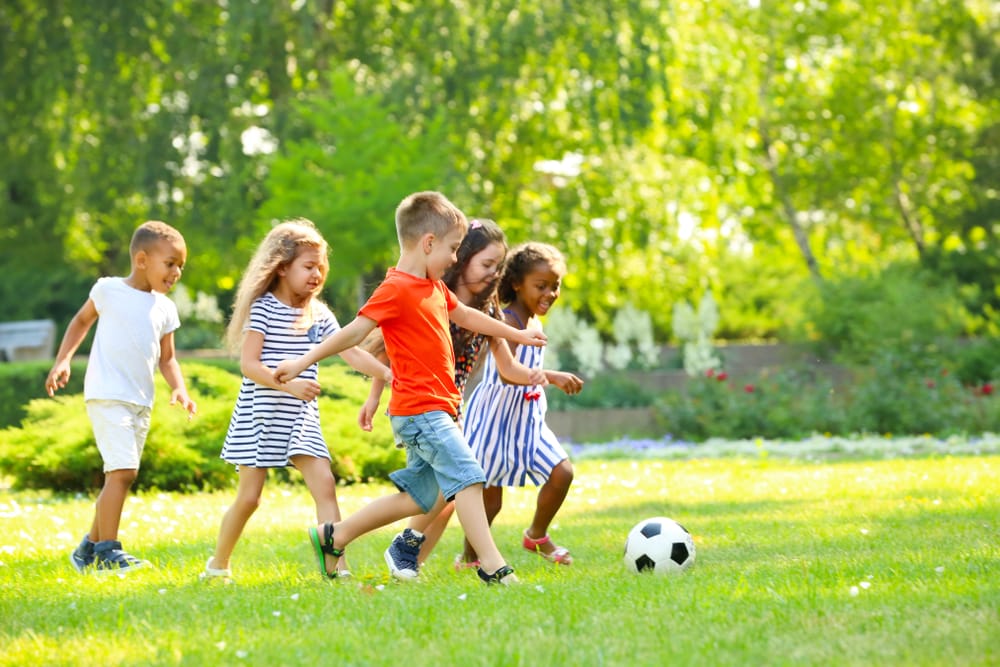
Brain and motor development are naturally important topics for parents of any young child, and there are several ways to promote these. One great example is the use of regular outdoor play, and this is one area where preschool, pre K and other child care programs are especially beneficial.
At Devlin's Child Development Center, we utilize outdoor play regularly across our pre K, preschool and other child care programs in Sandy, Utah. Here are some of the key ways outdoor play helps support brain and motor development in young children, from infants and toddlers up to pre K and even older kids.
Creativity is one of the top areas to look for when it comes to brain and motor development. This is where a child's brain learns how to think critically and come up with unique solutions to problems, which builds important neural pathways for future learning.
Outdoor play is proven to enhance creativity in children by providing them with the space, freedom, and inspiration to explore their surroundings and develop their own ideas. Whether it's building a fort out of sticks and leaves or creating an imaginary game with friends, outdoor play allows children to use their imagination and creative skills in a natural setting.
Two other vital areas that are strengthened through outdoor play are concentration and focus. In a world where technology is constantly vying for our attention, it's important for children to learn how to concentrate on one task at a time and stay focused on their goals. Outdoor play provides the perfect environment for this type of learning as children are faced with different challenges and obstacles while playing outside.
Through activities like climbing trees, building obstacle courses, or playing sports, children must use their concentration skills to navigate their way through tasks and stay focused on achieving their goals. This not only helps them in the moment but also teaches them valuable skills that they can apply in other areas of their lives.
Outdoor play also plays a crucial role in a child's emotional development. Being outside and engaging in physical activities can help children release any pent-up energy or frustration, reducing the likelihood of outbursts or temper tantrums.
Moreover, outdoor play allows children to interact with their peers in a natural and unstructured environment. This gives them the freedom to express themselves, make decisions, negotiate conflicts, and learn how to cooperate and communicate effectively with others.
In addition, being surrounded by nature has a calming effect on children, helping them relax and de-stress. This is especially beneficial for children who may struggle with anxiety or hyperactivity.
Playing outdoors also provides ample opportunities for socialization. As children engage in various activities, they are more likely to interact and play with their peers. This not only helps them develop important social skills, such as sharing, taking turns and resolving conflicts, but also allows them to form friendships and build a sense of community.
Furthermore, outdoor play often involves children of different ages and backgrounds, which encourages diversity and teaches them how to interact with people from various backgrounds.
Outdoor play can also have positive impacts on a child's cognitive development. Being in an unstructured environment stimulates their imagination and creativity as they explore new surroundings and come up with their own games and rules.
Nature also offers endless opportunities for learning – from identifying plants and animals to understanding the concept of cause and effect. For example, a child can learn that if they throw a rock into a pond, it will create ripples.
Down related lines, nature also plays a crucial role in a child's sensory development. The outdoors provides an array of sights, sounds, textures, and smells that help stimulate the senses and promote brain development.
For instance, when children engage in activities such as climbing trees or playing near a stream, they are exposed to different surfaces and textures which helps them develop their sense of touch. Similarly, listening to birds chirping or feeling the wind on their skin can enhance their auditory and tactile senses.
Moreover, being outdoors exposes children to new scents from flowers and plants which helps them develop their olfactory sense. This is important for overall sensory integration and can have long-term effects on a child's cognitive abilities.
As you can see, there are several major ways outdoor play supports brain and motor development in children. At Devlin's Child Development Center, we prioritize outdoor playtime for our young learners because we understand the importance and benefits it brings. Contact us today to learn about the use of outdoor play in any of our pre K, preschool or other child care programs around Sandy!
